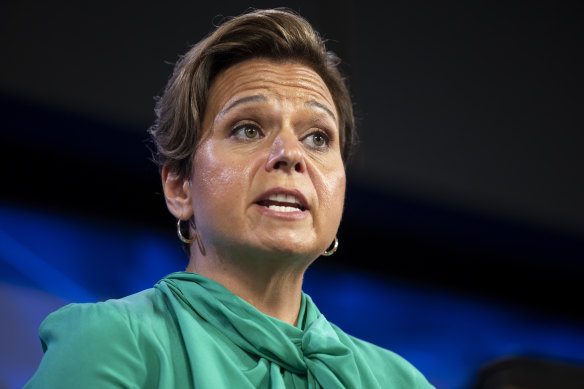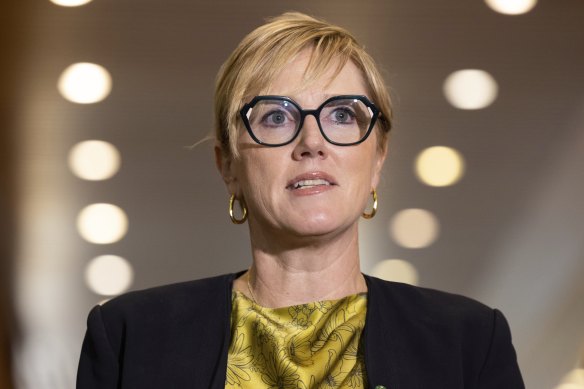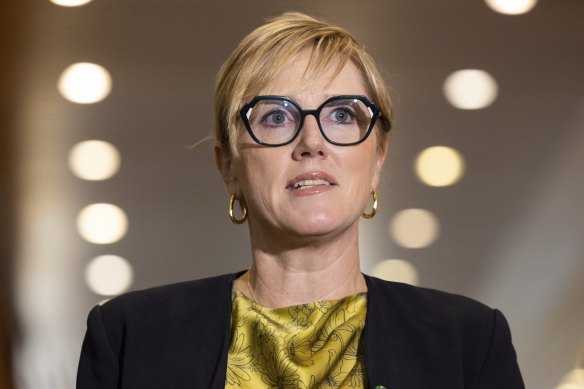Communications Minister Michelle Rowland is under increasing pressure from all sides of the gambling debate to reveal whether she will accept a parliamentary inquiry’s call for an advertising ban on betting products.
Documents seen by this masthead show that from June 29 to December 11, Rowland and her staff met with sporting codes, gambling companies and anti-gambling bodies, some of which had not made formal submissions to the inquiry, chaired by the late Labor MP Peta Murphy.

Communications Minister Michelle Rowland is under pressure to respond to a committee report on gambling.Credit: Alex Ellinghausen
Since the June 28 tabling of the inquiry’s report, which recommended a ban phased in over three years, Rowland’s office has had meetings with 54 stakeholders including the Alliance for Gambling Reform, Crown, Sportsbet, broadcasters and tech giants including Meta and Google.
In the fortnight after the report’s release, Communications Department deputy secretary Richard Windeyer emailed tech companies including Snapchat, Facebook, Google and TikTok seeking information on the potential monetary impact, volume of impacted ads and possible alternatives if a ban were implemented.
“The government is currently considering the report and will respond to the recommendations by the end of the year,” Windeyer wrote in his email on July 13. “While the committee’s recommendations do not represent government policy at this time, they are a public reference point.”
A spokesperson for Rowland said on Thursday the government would “announce a comprehensive response in due course”.
“The government is examining restrictions and engaging with stakeholders, including harm-reduction advocates, health experts and industry, as we develop our policy,” they said.
Since Murphy’s death from breast cancer earlier this month, Rowland has faced calls from within the Labor Party and independent MPs to deliver the ban in honour of her advocacy of the issue.
Independent MP Zoe Daniel, who introduced a private member’s bill to ban gambling advertising earlier this year, said Rowland should have responded to the report and “accepted its evidence-based recommendations” well before Christmas.
“Is she planning to drop it out during the silly season when she hopes no one’s looking while they’re at the beach or distracted by the cricket?” Daniel said.

Goldstein MP Zoe Daniel: “Is she planning to drop it out during the silly season when she hopes no one’s looking.”Credit: Alex Ellinghausen
Deakin University professor of public health Samantha Thomas, who also met with Rowland, said children would suffer the most if an outright ban on gambling advertisements wasn’t introduced.
“There’s a clear difference between the people that the government has met with whose main aim is to protect their economic interests, and the people … who are there to try and protect the health and wellbeing of the community,” she said.
“We need to see a very clear and robust response quickly. The longer we leave this, the more Australian children are exposed to the predatory marketing strategies of the gambling industry.”
A spokesperson for Responsible Wagering Australia, a peak body for wagering service providers, last week acknowledged community sentiment had changed regarding gambling ads, but said it opposed a ban.
“Introducing blanket bans would be extreme overreach and would rip hundreds of millions of dollars from sports and broadcasters – money which flows through to regional broadcasters, local and professional sport, sports integrity programs and Australian content,” the spokesperson said.
But anti-gambling advocates including the Salvation Army, Suicide Prevention Australia and Anglicare have urged Rowland and Prime Minister Anthony Albanese to accept the report’s recommendations.
“We know that broadcasters and sports codes have dusted off the scripts they used when tobacco advertising was banned,” they wrote in a joint letter on December 4.
“A three-year phase-in of the ban will give all sports and broadcasters ample opportunity to identify alternative revenue sources.”
Cut through the noise of federal politics with news, views and expert analysis from Jacqueline Maley. Subscribers can sign up to our weekly Inside Politics newsletter here.
